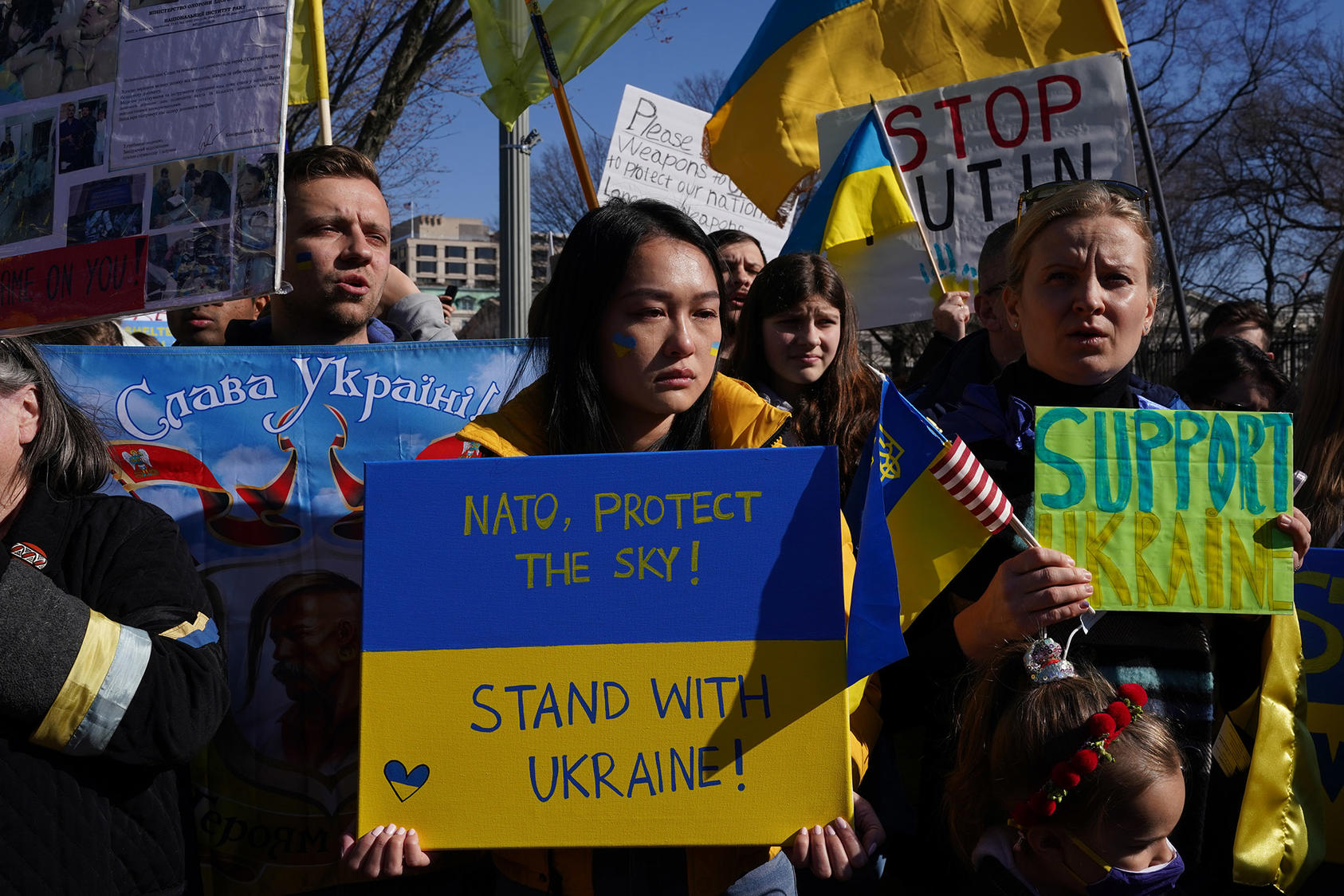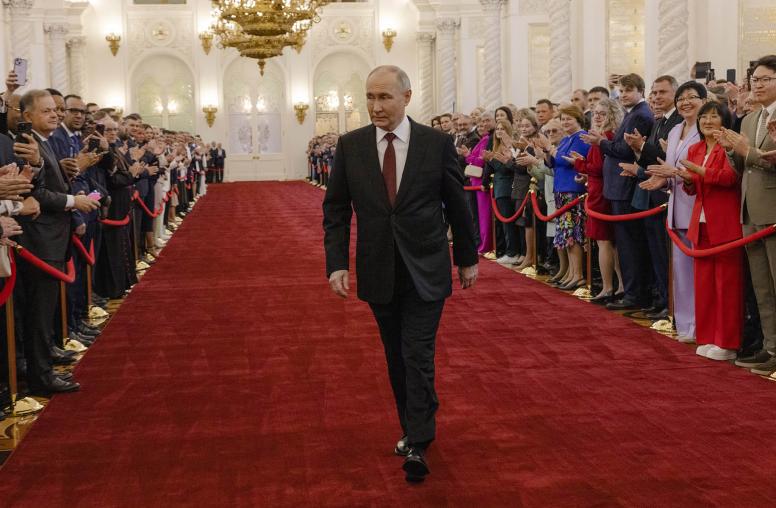This Global Resistance to Putin’s War Is Historic
Democracies are rallying to restore peace and the rule of law. Now, we must stay the course.
In just 15 days of Russia’s massive, new assault on Ukraine, democracies worldwide have mounted a historic act of repudiation — diplomatically, economically, militarily and morally. Nations are painfully cutting off trade with Russia. Thousands of public protests across 93 countries, including Russia, are deepening Vladimir Putin’s isolation. This collective support for Ukraine and rejection of Putin’s war is arguably the most unified global response to any act of state violence since the world’s opposition to European fascism during World War II. Sustaining it is how we can defeat Putin’s threat to world peace.

The speed of events makes it difficult even to track the full breadth of the world’s remarkable response — but pausing for a moment to take its measure is instructive. Even a partial summary illustrates the historic depth of the Kremlin’s isolation:
- The United Nations’ denunciation is overwhelming. After Russia alone vetoed a U.N. Security Council resolution, the U.N. General Assembly convened an emergency session, only its 11th since 1956, to demand Russia’s reversal of its actions. One hundred forty-one countries voted in favor, including governments that in recent years have been aligned with Putin, such as Serbia and Hungary.
- Popular protest has erupted worldwide, including in Russia. In the first nine days of Russia’s new war, more than 1,800 public demonstrations protested its unprovoked aggression, according to the independent research organization ACLED. The protests, across at least 93 countries and territories, included at least 150 demonstrations in Russia, “95 percent of which were met with state intervention,” including thousands of arrests, according to reports gathered and published by Russian citizens. Only the United States, Italy and France saw more protests than Russia itself, ACLED’s data showed. While such demonstrations will have no quick effect on Putin’s rule, Russians’ opposition to his war will only grow as their young soldiers, many of them conscripts, return home from Ukraine for burial.
- Escalated sanctions now include painful cuts to Russia’s trade. President Biden’s ban on U.S. imports of Russian oil was followed quickly by the European Union’s difficult decision to slash its purchases of Russian gas, upon which it relies heavily, by two-thirds within 10 months. Britain vowed to end all oil imports from Russia in the same time span. Energy exports are Russia’s economic aorta; these steps will multiply the pressures on Putin. The pullout from Russia of major corporations — from BP and Shell to McDonald’s and Starbucks — not only squeezes the economy but underscores to ordinary Russians the world’s revulsion at Putin’s brutality.
- Eastern Europe, once Soviet Russia’s satellite, is rushing to save Ukraine’s refugees. Ordinary citizens of Poland, Slovakia, Hungary and Romania are responding with compassion to the 2 million Ukrainians, mostly women and children, who have fled their homeland so far. In just days, Poland has absorbed 1.3 million refugees, many of them welcomed into Polish families’ homes. The embrace of Ukrainian refugees by Hungarians and the rest of Europe has forced Hungary’s prime minister to step back, at least partially, from his years-long embrace of Putin. The shared human experiences of just the past few days will shape new bonds between Europe and Ukraine for a generation to come.
- Governments and organizations are investigating war crimes for prosecution. The International Criminal Court announced that, at the request of 39 member states, it is investigating potential “war crimes, crimes against humanity or genocide committed on any part of the territory of Ukraine” since before Russia’s first attack on the country in 2014. Judicial authorities in in Germany and Spain have launched their own investigations with an eye to prosecute war crimes. The U.N. Human Rights Council overwhelmingly condemned Russia’s attack and launched the highest-level investigation it can conduct into war crimes — and the International Court of Justice at The Hague is fast-tracking a separate case raised by Ukraine.
- Democracies are sustaining military supplies to Ukraine. The United States and at least two dozen other nations are still sending arms and materiel to Ukraine’s armed forces, replacing prewar air shipments with trucks now hauling supplies by road across Ukraine’s western borders. Ukrainian officials have stressed their need for more, and more advanced, air defenses and antitank systems. Britain said yesterday it is increasing its supply of NLAW anti-tank missiles and will add short-range Starstreak air-defense missiles.
- Nations are increasing financial support for Ukraine. As of yesterday, Congress has included $14 billion in military, humanitarian and economic help for Ukraine in its current budget bill. The International Monetary Fund last night approved $1.4 billion in emergency funding, and the World Bank this week added $723 million in loans and grants.
The main driver of this historic movement is simple: the tsunami of repugnant facts. Journalists and ordinary Ukrainians have flooded news and social media with the most basic documentation — photos and videos of an unprovoked Russian assault that has crushed homes, hospitals and schools. Courageous Russian citizens have documented their own government’s suppression of news from Ukraine, independent media and public debate. The Russian human rights monitoring group OVD-Info has tracked what it says is Russia’s arrest of some 13,000 protesters so far. Still, leadership and coordination among the world’s democracies also has been vital to the response — and will remain so.
The Challenges to Come
We cannot know how long the Ukrainians will need to fight for their survival — nor how long our support must be sustained. But we must consciously think ahead, ready to maintain this historic, global isolation of Putin and his war machine for years. This will be neither easy nor cost-free.
In many Zoom calls and other meetings over recent days, Ukrainians have expressed to us their recognition of the world’s historic response to the assault on them — and their deep appreciation for this global empathy and support. In summation this week, one Ukrainian humanitarian worker now displaced from her home by the violence said, “I don’t know how this war will end, but we will win.” We must do everything in our power to prove her right.



